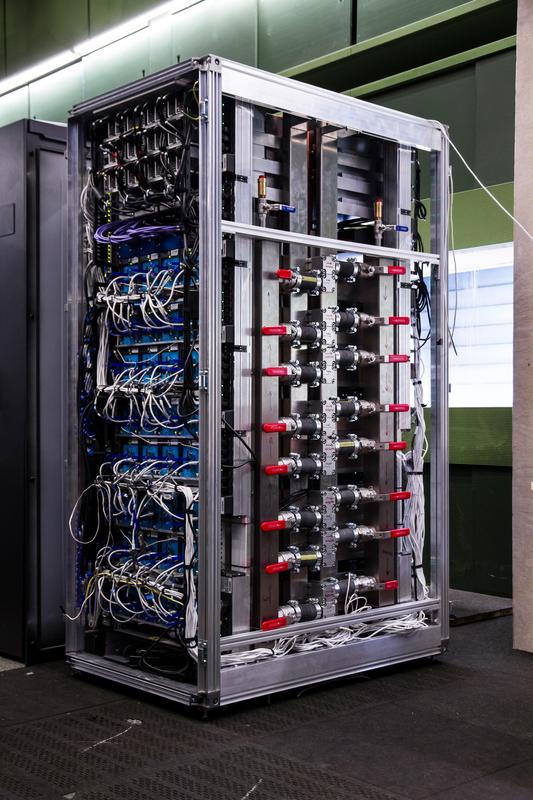

The new QPACE 2 system packs high performance in a single rack.
Photograph: Universität Regensburg
A new supercomputer prototype, QPACE 2, was recently installed and deployed in the computing center of Universität Regensburg. Its predecessor, the research computer QPACE, was the most energy-efficient supercomputer of the world at its time. QPACE stands for „QCD Parallel Computing Engine''.
The new supercomputer was developed by a group of scientists in the Physics Department of Universität Regensburg led by Prof. Dr. Tilo Wettig, in collaboration with the company Eurotech. It is being used for numerical simulations of quantum chromodynamics (QCD), one of the fundamental theories of elementary particle physics.
Although the QPACE 2 prototype is very small and fits in a single rack, it has a peak performance of 310 TFlop/s, i.e., 310 trillion floating-point operations per second. The system is water-cooled but does not need chilled water, which makes free cooling possible year-round. To achieve this goal a new technology was developed that also allows for a very high packaging and power density.
QPACE 2 is the second best Xeon Phi system on the Green500 list of the most energy-efficient supercomputers in the world and is ranked number 26 overall. It also made the Top500 list of the most powerful supercomputers in the world, where it ranks number 379.
QPACE 2 uses the Intel Xeon Phi processor (code name „Knights Corner'') with 61 compute cores. Within a rack, 256 of these processors are interconnected by a powerful network based on PCI Express and Infiniband.
The development of QPACE 2 was funded by the German research Foundation (DFG) in the framework of the Collaborative Research Center SFB/TRR-55 “Hadron physics from lattice QCD” at Universität Regensburg. The development of QPACE 3, which will use an improved version of the Xeon Phi processor (code name “Knights Landing”), is planned for next year.
Contact person:
Prof. Dr. Tilo Wettig
Universität Regensburg
Institute for Theoretical Physics
Tel.: 0941 943-2004
Tilo.Wettig@physik.uni-regensburg.de















